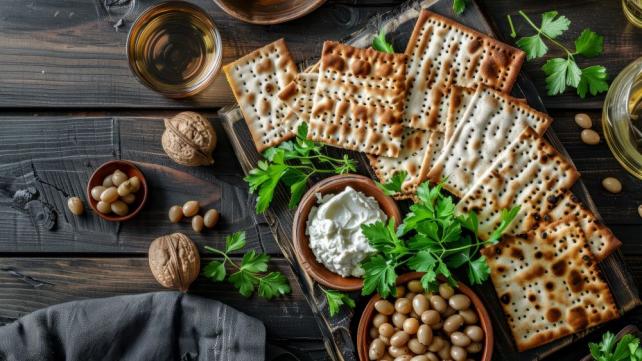
Prophet Musa (AS) is the most mentioned prophet in the Holy Quran. In fact, his name and experiences are recounted 136 times. These stories range from his divine birth and protection from Allah, his life experiences, his call to prophethood and most importantly his struggle against Pharoah (Firaun). It is Prophet Musa’s (AS) unique struggle against the Pharaoh that is celebrated by Jews on Passover (Pesach in Hebrew) each spring. Passover is typically listed on public school calendars and Jewish students are often excused from school without penalty on four of this eight-day observance. Many Muslim children may know of the holiday by name only but have no reference to what we learn from the Quranic account about the Qadr of Allah, obedience and unwavering faith.
With the strained relations between Muslim and Jewish people due to current political events, many may not realize that the events commemorated in Passover are included in the Holy Quran. As parents we teach our children to respect the traditions of other peoples, especially when they have a connection with Islam.
Muslims fast on the Day of Ashura, which is a day that commemorates the success of Prophet Musa (AS) over Pharoah and his people. Prophet Muhammad (SAW) fasted on this day and Muslims follow his excellent example. Passover and Ashura are two distinctly different holidays, but Muslims acknowledge the Qadir and Power of Allah as he delivered the followers of Prophet Musa (AS).
Passover lasts for eight days and is a major Jewish holiday that commemorates the Israelite deliverance from the oppression and injustice of Pharoah. During this time, Jews consume a ‘Seder’ meal that consists of unleavened bread, bitter herbs and a dark colored sweet made of chopped fruit and nuts. Each night they retell the story of the followers of Musa (AS) exodus and recount the injustice of Pharoah. For some Jewish sects the first-born son will fast from sunrise to sunset on the day before to commemorate the Qadr of Allah and how Allah ordained the firstborn sons of those who followed Prophet Musa (AS) were to be spared from the plague of death while the firstborn sons of people of Pharoah were not.
˹Consider˺ when Moses said to his people, “Remember Allah’s favor upon you when He rescued you from the people of Pharaoh, who afflicted you with dreadful torment—slaughtering your sons and keeping your women. That was a severe test from your Lord.”
Surah Ibrahim:6
The Quran gives a detailed account of the events that lead to the punishment of the people of Pharoah and then the subsequent release of the followers of Prophet Musa (AS) from the hardships of slavery and oppression. It is important for Muslim parents to ensure that their children understand the story and put the events in the perspective of how they demonstrate divine decree, faith and obedience.
The first part of his journey in defeating Pharoah required that Prophet Musa (AS) accept that it was the Qadr of Allah that he was chosen as a prophet.
[Allah] said, "O Moses, I have chosen you over the people with My messages and My words [to you]. So take what I have given you and be among the grateful."
Surah Al Araf: 144
Then Prophet Musa (AS) relied upon Allah with unwavering faith. When the magnificence of Allah is revealed to Prophet Musa (AS) it is more than he can even comprehend and so he falls unconscious. The sincere faith of Prophet Musa (AS) is amplified.
And when Moses arrived at Our appointed time and his Lord spoke to him, he said, "My Lord, show me [Yourself] that I may look at You." [Allah] said, "You will not see Me, but look at the mountain; if it should remain in place, then you will see Me." But when his Lord appeared to the mountain, He rendered it level, and Moses fell unconscious. And when he awoke, he said, "Exalted are You! I have repented to You, and I am the first of the believers."
The experiences of Prophet Musa (AS) also teach us about obedience. As he approached Pharoah, Prophet Musa (AS) knew that by obeying what Allah inspired him to do, he would be able to demonstrate the power and glory of Allah.
Then We inspired Moses, “Throw down your staff,” and—behold!—it devoured the objects of their illusion!
Surah Al Araf: 117
His faith in the power of Allah was unwavering as the people of Pharoah suffered the punishment of their disobedience.
So We plagued them with floods, locusts, lice, frogs, and blood—all as clear signs, but they persisted in arrogance and were a wicked people.
Surah Al-Araf: 133
When the magicians of the people of Pharoah saw the manifestation of the power of Allah, they submitted.
So the magicians fell down, prostrating.
They declared, “We ˹now˺ believe in the Lord of all worlds—
the Lord of Moses and Aaron.
Surah Ash Shu’ara: 46-48
But Pharoah was enraged and devised a strategy to get rid of Prophet Musa (AS) and his followers. Prophet Musa (AS) was inspired by Allah, to leave during the night. But Pharoah amassed his forces and pursed the followers of Prophet Musa (AS). Prophet Musa (AS) was unafraid and secure in his belief that Allah would intervene and save him and his people.
So We inspired Moses: “Strike the sea with your staff,” and the sea was split, each part was like a huge mountain.
Surah Ash Shu’ara: 63
And then we drowned the others
Surah Ash Shu’ara: 66
This deliverance from the oppression of Pharoah is all part of the story that Jewish people remember each evening during the Passover holiday. These lessons of the Qadr of Allah, faith and obedience demonstrated by Prophet Musa (AS) are important to the Muslim community and should make the Passover holiday more understood.



Add new comment